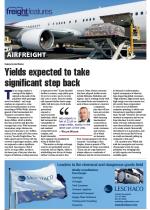Af rica is expected to see its airlines post a $638 million loss in 2022 and improve to a loss of $213m in 2023. This represents the combined performance of all airlines, with losses offset by the performances of a handful of profitable carriers, although some owe their performances to advantageous regulatory frameworks that limit competition, according to Kamil Alawadhi, The International Air Transport Association’s (Iata) regional vice president for Africa & Middle East.“For air cargo specifically, we anticipate a slight improvement in cargo loads as a percentage of available tonne kilometres, with average load factors increasing from 61.2% in 2022 to 63.9% for 2023. Nevertheless, this will fall 0.7% short of the 64.6% forecast breakeven cargo load factor. We will have to look to the following years for overall profitability.”He said resistance to the full implementation of the Africa Continental Free Trade Area (AfCFTA) and its accompanying programmes, the Single Africa Air Transport Market and the Free Movement of Persons Protocol, was a concern as it was standing in the way of much-needed economic expansion and growth. “Some countries are holding back because they are concerned about jobs for their citizens being taken away by migrants. But this short-sightedness is just thwarting efforts to promote intra-African economic activity, which will create more jobs and help them attain social st abilit y.”Nevertheless, said Alawadhi, air cargo had a crucial role to play in this as it represented the safest, fastest and most efficient way of moving goods and people between African markets, many of which are separated by wide distances, inhospitable terrain, inefficient borders, and poor or non-existent land transport infrastructure.According to the United Nations, World Bank and other studies, Africa will have two – Lagos and Kinshasa – of the world’s 10 largest cities by 2050. Their economic sustainability will depend heavily on increased access to and connectivity with markets.From a more global perspective, the biggest challenges facing the air cargo sector at present were the combination of higher costs – especially jet fuel – and the slower pace of economic growth, said Iata director-general Willie Walsh.“Jet fuel was averaging $138.3 per barrel in 2022, and typically represents about 30% of airlines’ costs.”He said the weaker global economy, manifesting both in manufacturing bottlenecks and lower consumer spending, was just as concerning. “China’s extended Covid lockdowns have caused chip shortages and fewer shipments. It is causing manufacturers of electronics and appliances to reorganise their supply chains to ensure future business resilience.“The situation is compounded by Russia’s invasion of Ukraine, which has propelled energy and fuel prices, triggering waves of other inf lationary cost increases. Treasuries are trying to contain inf lation by hiking interest rates on borrowings, all of which are curtailing spending by businesses and individuals.”

